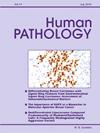Assessment of Nectin4-expression in vulvar squamous cell carcinomas (VSCC): correlation with HPV-associated and HPV-independent molecular subtypes
IF 2.6
2区 医学
Q2 PATHOLOGY
引用次数: 0
Abstract
Background
The development of antibody-drug conjugates (ADC) for cancer treatment has achieved promising results in different solid tumors and targets. Enfortumab-Vedotin (EV), a humanised anti-Nectin4-IgG1 monoclonal antibody linked to the microtubule-disrupting agent monomethyl auristatin E (MMAE), is an FDA-approved Nectin4-directed ADC for the treatment of locally advanced or metastatic pre-treated urothelial cancer. Targeted therapy with EV requires the expression of Nectin4 within the tumor cells. The present study evaluates Nectin4 expression in vulvar squamous cell carcinomas (VSCC) and its correlation to different VSCC molecular subtypes.
Methods
Immunohistochemical Nectin4-expression was evaluated semiquantitatively on diagnostic biopsies of VSCC using an immunoreactive score (IRS). There was a correlation between IRS and different molecular subtypes of VSCC.
Results
All 55 cases showed at least weak Nectin4 expression within the tumor cells with a median IRS of 6.0 (range 2–6) indicating high expression levels in most tumors. Moderate/high expression (IRS ≥4) was more frequent in HPV-associated tumors (p16+ve/p53 wt molecular subtype: 12/14 (85.7 %) when compared to HPV-independent VSCC (22/35 (62.9 %) in p16−ve/p53abn and 0 % in four p16−ve/p53 wt) VSCC, a difference that is not statistically significant.
Conclusion
Most VSCC show high expression of Nectin4, including the HPV-independent VSCC containing a TP53-mutation (p16−ve/p53abn molecular subtype), that are associated with the worst prognosis. Therefore, Nectin4-directed ADC such as Enfortumab-Vedotin (EV) may present a potential treatment option in VSCC. Nectin4-expression can easily be assessed by immunohistochemistry on diagnostic biopsies. Clinical trials exploring Nectin4-directed ADCs such as EV are necessary.
外阴鳞状细胞癌(VSCC)中nectin4表达的评估:与hpv相关和hpv独立分子亚型的相关性
背景:用于癌症治疗的抗体-药物偶联物(antibody-drug conjugates, ADC)在不同的实体肿瘤和靶点上取得了可喜的成果。Enfortumab-Vedotin (EV)是一种人源化抗nectin4 - igg1单克隆抗体,与微管破坏剂monomethyl auristatin E (MMAE)相连,是fda批准的用于治疗局部晚期或转移性预处理尿路上皮癌的nectin4定向ADC。EV靶向治疗需要肿瘤细胞内Nectin4的表达。本研究探讨了外阴鳞状细胞癌(VSCC)中Nectin4的表达及其与VSCC不同分子亚型的相关性。方法:采用免疫反应评分法(immunoreactive score, IRS)半定量评估VSCC诊断活检中nectin4的表达。IRS与VSCC不同分子亚型之间存在相关性。结果:所有55例肿瘤细胞内至少有弱表达Nectin4,中位IRS为6.0(范围2 - 6),表明在大多数肿瘤中都有高表达。与hpv无关的VSCC相比,hpv相关肿瘤(p16+ve/p53wt分子亚型:12/14(85.7%))中/高表达(IRS bbbb4)更为常见(p16 -ve/p53abn为22/35(62.9%),4个p16-ve/p53wt为0%)VSCC,差异无统计学意义。结论:大多数VSCC均高表达Nectin4,包括含有tp53突变(p16-ve/p53abn分子亚型)的hpv非依赖性VSCC,其预后最差。因此,以nectin4为导向的ADC,如Enfortumab-Vedotin (EV),可能是VSCC的潜在治疗选择。在诊断性活组织检查中,免疫组织化学可以很容易地评估nectin4的表达。探索nectin4导向adc(如EV)的临床试验是必要的。
本文章由计算机程序翻译,如有差异,请以英文原文为准。
求助全文
约1分钟内获得全文
求助全文
来源期刊

Human pathology
医学-病理学
CiteScore
5.30
自引率
6.10%
发文量
206
审稿时长
21 days
期刊介绍:
Human Pathology is designed to bring information of clinicopathologic significance to human disease to the laboratory and clinical physician. It presents information drawn from morphologic and clinical laboratory studies with direct relevance to the understanding of human diseases. Papers published concern morphologic and clinicopathologic observations, reviews of diseases, analyses of problems in pathology, significant collections of case material and advances in concepts or techniques of value in the analysis and diagnosis of disease. Theoretical and experimental pathology and molecular biology pertinent to human disease are included. This critical journal is well illustrated with exceptional reproductions of photomicrographs and microscopic anatomy.
 求助内容:
求助内容: 应助结果提醒方式:
应助结果提醒方式:


